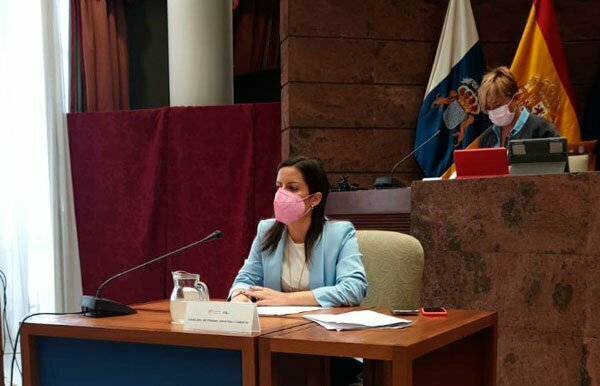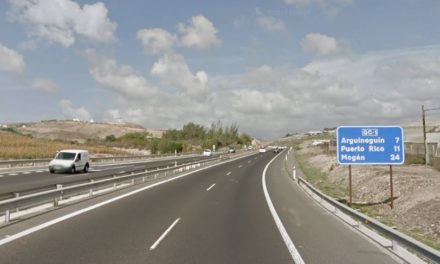The Canary Islands Minister of Tourism, Industry and Commerce, Yaiza Castilla, in the Regional Parliament this Friday, has appealed to Spain’s central Government for an expansion to the list of diagnostic tests, required to enter Spain from a high risk country, to also include rapid antigen tests. Castilla is doing what she can to try to salvage the main winter season, as Spain prepares to impose, as of Monday 23 November, potential fines on anyone arriving from a high risk zone without the requisite negative PCR results, which must be obtained within 72 hours prior to arrival.
Castilla said “if the State continues with the PCR requirement only, the bulk of bookings will be cancelled, since operators see it as completely unfeasible, due to logistics, cost and difficulties in accessing these tests in some regions”. She warned of a new Tourism Zero (#Tourism0) for the Islands, following the decision just days after the region had expected to be able to salvage the winter, and as several countries added the islands to their ‘safe corridors’ lists. Castilla insisted “if we manage to overcome this new obstacle, it is still possible to reach five million tourists in 2020, as we received 4 million up to September, and in this last quarter it is not unreasonable to aspire to receive 25% of the demand for the same last three months of 2019”. The Minister warned that “the situation is very changeable”, but forecast that the winter season will end with a total of 2.7 million tourists, more than four million less than last winter, a drop of 62%.
Castillo emphasised that the islands have been preparing for tourists in the safest way possible in “design and implementation of protocols, involving the whole of Canarian society in reducing the number of infections, paying for special insurance that covers any tourist who did get infected here, and the creation of a decree obliging tourists to present a negative COVID-19 test when arrive at a tourist establishment” as well as many other steps over recent months. All of their research points to it being safe to include rapid antigen tests for travellers wishing to come to the islands.
The Canary Islands have also been extensively promoted as the only open and safe European tourist destination, in the face of huge restrictions on travel, with a 100% digital approach, campaigns have been launched in several countries including Germany, the United Kingdom, Sweden, Denmark, Italy, France and Austria. She pointed to the importance of being able to maximise the return on investment, with well planned strategies to keep the islands at the forefront of people’s minds in these key markets of origin.
 Whether a country is high risk or not is decided using criteria set by the ECDC, using a Europe-wide “traffic light” system. Among the main criteria is the rate of infection over a 14-day period, anything more than 150 cases per 100,000 population is deemed of serious concern and high risk. The numbers are regularly reviewed, taking into account other factors also such as the percentage of test results that come back positive. Across Europe, including mainland Spain, the combined infection rate is currently more than 450 per 100,000 population, however in the Canary Islands it stands at less than 80 per 100k and is continuing to drop.
Whether a country is high risk or not is decided using criteria set by the ECDC, using a Europe-wide “traffic light” system. Among the main criteria is the rate of infection over a 14-day period, anything more than 150 cases per 100,000 population is deemed of serious concern and high risk. The numbers are regularly reviewed, taking into account other factors also such as the percentage of test results that come back positive. Across Europe, including mainland Spain, the combined infection rate is currently more than 450 per 100,000 population, however in the Canary Islands it stands at less than 80 per 100k and is continuing to drop.Ireland has recently moved from Red “High Risk” to Amber “Risk” and so in theory visitors from the Emerald Isle will no long need to produce a negative PCR test to enter Spain, however they will still be required to have Rapid Antigen test, available on arrival, to check in to a hotel.
The primary issues for travellers revolve around the expense and availability of testing, with PCR tests costing more than 100€ a time and taking up to 48 hours to produce results, where as the antigen test costs 25€ with results possible in just 15 minutes. Major airports such as Gatwick, in the UK, have announced the implementation of PCR tests for just 60€ and more widespread availability is expected to try to meet demand over coming weeks, improving the ease with which travellers can comply.
The European Commission this week recommended the use of antigen tests for travel, however, due to the variability of the tests available on the market, EU leaders have so far only agreed to work on a set of standards that will allow this to move forward, and so their use has not yet been approved, with PCR still being highlighted as the most accurate test available













